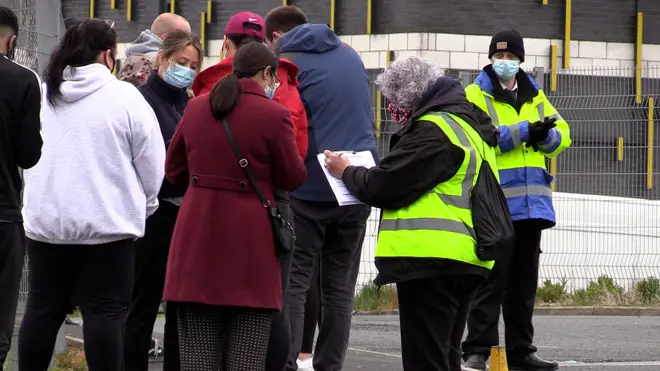
Paul Brand 10am - 12pm
16 May 2021, 07:11 | Updated: 16 May 2021, 07:16

The government hopes to increase Britain's vaccine rollout to a million jabs a day in an attempt to beat the increasing prevalence of the Indian Covid-19 variant.
Experts have urged people to take a cautious approach to social interaction ahead of the major easing of coronavirus restrictions tomorrow.
Ministers are pushing ahead with the changes with despite concerns over the Indian variant of Covid-19.
Ministers have told MPs they expect to increase daily doses from 500,000 to 800,000 within a fortnight, by drawing on a stockpile of 3.2 million doses, according to the Telegraph.
READ MORE: PM defends not closing UK's borders to India sooner

JCVI member tips vaccination key to protection against Indian strain
They hope to keep daily doses at “800,000 and above”, putting the target of one million first and second jabs a day in sight, the paper reported.
Different households in England, Wales and most of Scotland will be allowed to socialise indoors - including at pubs and restaurants - for the first time in months.
Professor Robert Dingwall sits on the New and Emerging Respiratory Virus Threats Advisory Group.

PM confirms Monday's roadmap stage will go ahead
He believes the government is doing the right thing in pressing ahead. He said: "Somewhere between 70 and 80 per cent of people now have a significant level of immunity.
"This is a completely different situation to last Spring, or even to the beginning of January. We have to stop being scared by every variant that comes along."
Thousands of holidaymakers are preparing to head overseas when the ban on foreign leisure travel is lifted in England and Wales on Monday.
Travel firms have reported a surge in demand for trips to Portugal, after the Government put the country on its green list for travel.
That means returning travellers will not need to self-isolate on their return, and are only required to take one post-arrival test.
EasyJet has added 105,000 extra seats to its flights serving green-tier destinations, while Tui will use aircraft which normally operate long-haul routes to accommodate the surge of people booked to fly to Portugal.
Only a dozen countries and territories are on the green list but most are either remote islands or do not currently allow UK tourists to enter.
The Government is advising people not to make non-essential trips to locations on its amber list, which covers popular destinations such as Spain, France, Italy and Greece.
But this guidance is expected to be ignored by some holidaymakers.
Those who do travel will be required to self-isolate at home for 10 days on their return, and take two post-arrival tests.
They can end their quarantine early if they receive a negative result from an additional test taken after five days.
Travel firms such as airlines and tour operators have called for quarantine and testing requirements to be relaxed, and for more destinations to be added to the green list.
The Government has pledged to update its lists on June 7, and will review its overall policy in relation to arriving travellers on June 28.
Scotland will permit foreign holidays from May 24.
Non-essential travel from Northern Ireland to the Common Travel Area - which consists of the UK, Republic of Ireland, Channel Islands and Isle of Man, will be allowed from the same date.